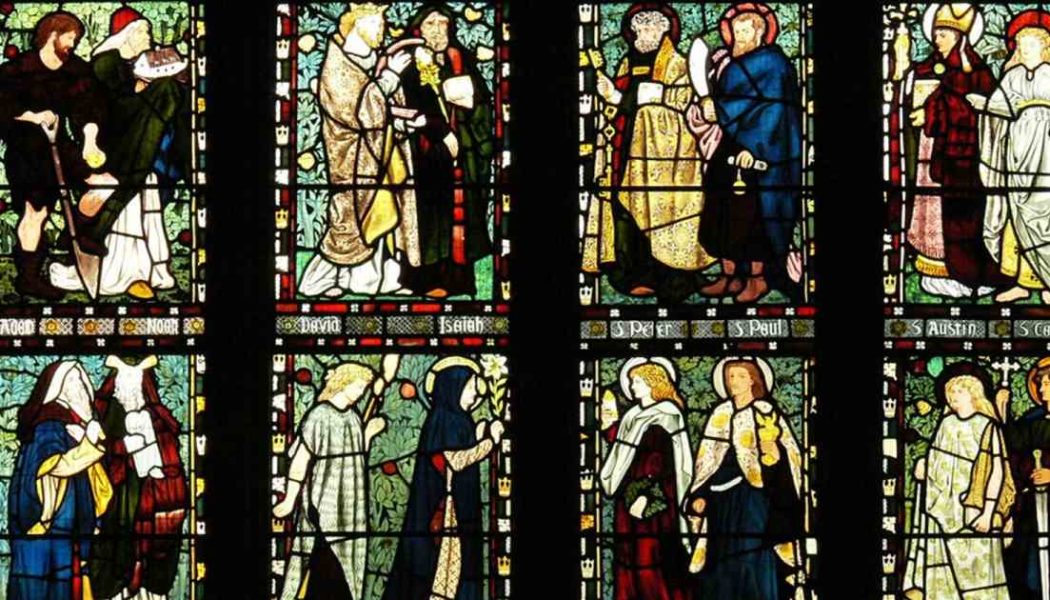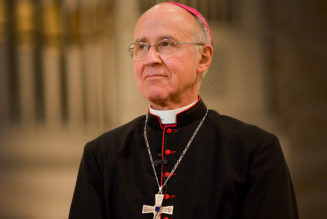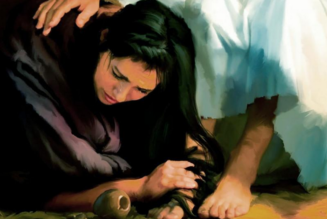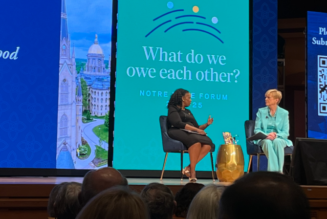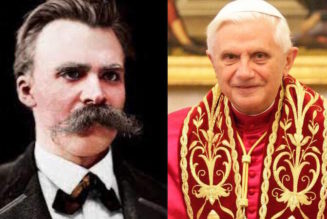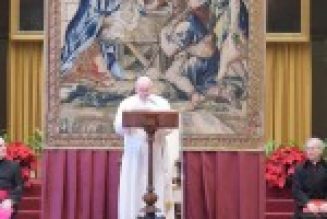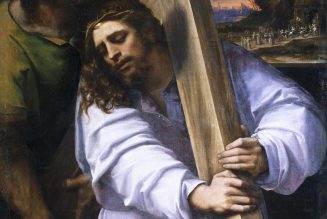
We wait and wait and wait and then, finally, it happens! The big reveal, the Good News, the grand conclusion to our waiting. What we learn is: We have to wait some more. A lot more.
We see a lot of people who are models of that on the Feast of the Holy Family of Jesus, Mary and Joseph, Year B.
This is always the way with God. He wants us to be in a state of growing anticipation, not sinking disappointment. He likes anticipation better than waning interest. And what we do while we wait turns out to be the real thing he wants: Our attention to our lives in the context of his.
So, let’s give him what he likes, like Simeon, Anna and the Holy Family did.
Sunday’s Gospel depicts the Holy Family meeting two waiting figures: Simeon has been waiting his whole life to see the Messiah. Anna the prophetess has been in the Temple predicting the salvation of Israel for years after her husband died. And now they both see Jesus, Joseph and Mary.
If the ancient understanding that Our Lady was presented in the Temple as a child is true (as I believe it is) then this is not the first meeting of Simeon with Mary or Anna with Mary. The Temple was a big place, but hangers-on at the Temple surely would have seen the girl presented in the Temple to study, perhaps in a group of others.
Pious legends say Temple leaders certainly noticed her. Simeon who seems so attentive and observant, surely would have. And Anna, a Temple woman, would likely have had some involvement with a girl who was presented there.
Maybe they had noticed how special she was and expected something to come about in her life — so in addition to waiting for salvation history to reach a definitive point, they may have been waiting for Mary’s history to hit a definitive point. Or maybe knowing Mary made it easier to believe that a moment of salvific importance had arrived: This extraordinary girl had brought something extraordinary to the world, like they knew she would.
Imagine Simeon’s long wait: Knowing that he would see the Messiah, and probably expecting it with each new important figure who wielded power in the Temple and the world. And here was this child, who communicated something more than an ordinary child. This was a child that magi from the east were willing to prostrate themselves before, and that shepherds left their flocks at night to gape at.
“Now you may let your servant go in peace,” he said. “For my eyes have seen the salvation you promised.” What salvation? The child Mary held would do nothing for a long time — certainly not in Simeon’s lifetime. And Anna celebrates the redemption of Israel — which at the time of this incident is 33 years away.
But you get the sense that Simeon is going to live his life with a new intensity anyway. That’s what God wants: The kind of waiting that is fills us with faith, hope and love.
This has been God’s operating procedure for a long time.
Abraham in one of the possible First Reading choices was promised descendants as numerous as the stars. The reading itself shows the length of time he had to wait. There is a gap of six chapters between the first and second half of the reading. A lot happened in that time.
The first half of the First Reading begins in Chapter 15 of Genesis. There are torn animals and a flaming urn and the promise of many descendants. Then it skips ahead to chapter 21. What do we miss?
- In Chapter 16, Abram’s wife tells him to have children with Hagar the servant. He does. She regrets it nearly instantly.
- In Chapter 17, God makes a new covenant and renames Abram Abraham. The Lord institutes circumcision.
- In Chapter 18, Abraham greets the Lord as three angels visit and announces that the child will come in a year.
- In Chapter 19, Lot mistreats his daughters and flees Sodom. His wife turns into a pillar of salt.
- In Chapter 20, Abraham lies about his wife, saying she is his sister to King Abimelech.
Then the reading returns to Chapter 21, and Isaac is born.
Once you know what happened in the gaps, you see the importance of waiting well.
Everything that goes wrong in that time stemmed from the inability to wait: Abraham and Sarah came up with an alternate plan to God’s for their family, involving Hagar, and hardships ensued. Circumcision had to be instituted to repair the relationship with God, and as a lifelong warning to men of the failure of their Father Abraham to wait well. The people of Sodom refused to wait to do things God’s way, committing one of the Bible’s sins that cry out to heaven; Lot’s wife refused to wait to know the fate of Sodom, and suffered for it; Lot refused to wait and sinned with his daughters, and on and on.
God’s timing is entirely God’s. Like a cake, turning up the heat won’t speed it up, but will only spoil it. Abraham’s shortcuts only multiplied his problems.
All of which brings us back to what we should do while we wait.
It’s Holy Family Sunday, and we can directly apply these lessons in our lives. Our families work out well if we wait well; if we do not try to rush into sexual relationships before their time, if we live within our means; if we stop trying to force our way onto others but work within moral limits. If we get impatient and take shortcuts, life won’t work out well at all. St. Paul tells the Colossians what virtues to focus on: “heartfelt compassion, kindness, humility, gentleness and patience,” he says, then emphasizes “patience.”
Don’t get sick of waiting, but “bear with one another, forgiving one another. If one has a grievance against another, as the Lord has forgiven you, so must you also do.”
Bear with your father, your mother, your sister, your spouse. Stay with them through the hard times and wait patiently for better times. Stay and see your family grow; leave and it will shrink and die.
This is the upshot of what Simeon tells Mary, too. A sword will pierce her soul: she will suffer pain because of this child. He also tells her that you and I suffer that, too. He will bring about “the fall and the rise of many,” and he is destined “to be a sign that will be contradicted” and “the thoughts of many will be laid bare.”
The falling and rising of many, the sign that is contradicted, the thoughts laid bare: All of this will hit us while we wake. Therefore — wait the way Abraham, Joseph, Simeon, Mary and Anna waited. Wait with the virtues Paul spells out. “And over all these put on love.”
God will never forget his promises. He never has, and he never will. It just might take an awfully long time.
Image: Alwyn, Flickr.
